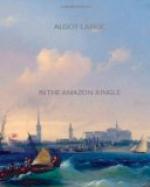We had a slight advantage in retracing our former path. Although the reedy undergrowth had already choked it, we were travelling over ground that we knew, and it was also no longer necessary to delay for the building of tambos; we used the old ones again.
Jerome had complained for some time of a numbness in his fingers and toes, and also of an increasing weakness of the heart that made every step a torment. The Chief and I tried our best to cheer him up, although I felt certain that the brave fellow himself knew what dreadful disease had laid its spell upon him. However, we kept on walking without any words that might tend to lower our already depressed spirits.
But our march was no longer the animated travel it had been on the way out; we talked like automatons rather than like human, thinking beings. Suffering, hunger, and drugs had dulled our senses. Only the will to escape somehow, the instinct of self-preservation, was fully awake in us. A sweep of the machete to cut a barrier bushrope or climber, one foot placed before the other, meant that much nearer to home and safety. Such was now the simple operation of our stupefied and tired brains, brains that could not hold one complex thought to its end; too tired—tired!
At nightfall we stumbled into our old tambo No. 7. There was no thought of securing food, no possibility of getting any; we had been too tired to even attempt to shoot game during the day. The two monkeys which the Indian had killed with his blow-gun were the only food we had and these we now broiled over the camp-fire and devoured fiercely. After this meal, none too good, we slung our hammocks with difficulty and dropped in. Jerome’s numbness increased during the night. We were up and on the trail again with the dawn.




